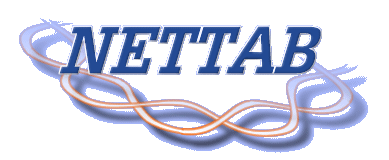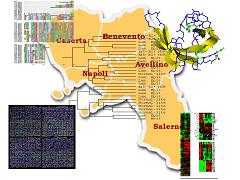
|
Joint NETTAB 2010 and BBCC 2010 workshops focused on Biological Wikis November 29 - December 1, 2010, Naples, Italy |

|
|||||||
Invited Speakers
- The Pros and Cons of Wikipedia for Scientists
Alex Bateman, Wellcome Trust Sanger Institute, Hinxton, Cambridge, United Kingdom
Alex Bateman is a Senior Investigator at the Wellcome Trust Sanger Institute. He won the 2010 Benjamin Franklin Award for Open Access in the Life Sciences issued by the Bioinformatics Organization.
His scientific goal is "to completely and accurately classify protein domains and non-coding RNAs". The Pfam database that he runs now contains over 12,000 entries and represents a world-leading resource. In 2003 he founded the Rfam database of non-coding RNAs that provides annotation and models for hundreds of RNA families. Recently he has been involved in using Wikipedia as a source of community annotation for the Rfam database.
Wikipedia is the most successful community annotation project of all time. But can it be used successfully for scientific information? I will discuss the strengths as well as the weaknesses of the Wikipedia approach. In particular I will discuss the issue of getting scientists engaged in editing Wikipedia as well as show examples of spectacular failures.
- Collaborative publishing with authorship tracking and reputation system - WikiGenes
Robert Hoffmann, Computational Biology Center, cBIO, Memorial Sloan-Kettering Cancer Center, MSKCC, New York, USA
Robert Hoffmann, computational biologist, studied Genetics at the University of Vienna and received his Master's degree in Bioinformatics at the Institute of Molecular Pathology (IMP). In 2001, he moved to Madrid to achieve his doctoral thesis. During his PhD he contributed to the areas of text mining in the biomedical literature (see iHOP - Information Resource for Biology and Medicine), the comparative analysis of protein networks, and the evolution and dissemination of scientific knowledge.
In 2006, he was awarded with the Society in Science Branco Weiss Fellowship, to explore novel ways of data and information management with the aim to improve the efficiency of global scientific research and also bring science closer to society. The initial part of this project was carried out at the Massachusetts Institute of Technology (MIT) at the group of Sir Tim Berners-Lee and has led to the development of the WikiGenes project.
WikiGenes is the first collaborative publishing system to unite traditional and collaborative publishing based on exclusive authorship tracking technology. Whereas Wikipedia and conventional wikis have a limited realm of encyclopaedic knowledge by anonymous contributors, the authorship tracking technology in WikiGenes links every sentence and every word to its author, enabling experts to share their latest and original thoughts. For instance, experts from around the world can create authoritative review articles on highly specific subjects years before this knowledge would enter traditional forms of publication.
The way scientific insights are published and communicated has remained essentially unchanged since the days of Charles Darwin. As a result, facts pertaining to specific genes, chemicals and pathologies are scattered over hundreds and even thousands of different articles and journals. Unfortunately, the wisdom of crowds, so useful in gathering well-established knowledge, is inadequate to integrate these highly specific bits of knowledge into a bigger picture.
The authorship tracking technology in WikiGenes makes it possible that originators of information -scientists themselves- can publish their insights while contributing at the same time to a body of structured, semantically enriched and integrated knowledge.
In WikiGenes, authors who invest time and knowledge in their contributions are given due credit, and readers can always know the author of any part of a collaborative article. Instead of dispersing new insights in an arbitrary way over thousands of scientific journals, experts can publish their insights in context, like pieces of a jigsaw puzzle.
WikiGenes is open access and available online at http://www.wikigenes.org/.
- WikiPathways, community-based curation for biological pathways
Alexander Pico, Gladstone Institute of Cardiovascular Disease, San Francisco, USA
Bioinformatics Group Leader, Software Engineer, Gladstone Institutes, UCSF, San Francisco, USA
He is co-creator, developer and curator of WikiPathways. He is interested in network visualization and analysis software tools and crowdsourcing science.
Assembling biological pathways from information in scientific literature and biological databases is a challenging task. Building a pathway requires domain knowledge from specialists in various biological research areas. Furthermore, research is generating new biological knowledge continuously, making pathway curation an ongoing and dynamic process. To facilitate this process we developed WikiPathways (see Pico AR, Kelder T et al, PLoS Biology, 2008), a wiki where users can curate pathways, using an easy to use pathway drawing tool.
WikiPathways currently has over 1100 registered users and contains more than 1300 pathways for various organisms, spanning human, mouse, zebrafish, fruit fly, worm, yeast, plants and bacteria. WikiPathways is entering a phase of rapid growth, incorporating new pathway resources and engaging diverse communities with unique pathway needs.
In this presentation, we will provide an overview of the current state of WikiPathways and highlight several approaches we take to improve community-based curation on WikiPathways:
- Easy to use curation tools lower the threshold for new users to start contributing. These tools facilitate pathway editing, establishing gene linkouts, citing literature, pathway tagging (e.g., by quality and ontology), tracking changes and threaded discussions.
- Contributors receive credit for their work, for example by prominently listing authors for each pathway, ranking contributions and actively distributing pathway content through a CC license. These are examples of micro-attribution and open access that are transforming scientific publishing.
- The utility of pathways as a research tool is an important incentive for our users. Therefore, we actively work on integrating new biological databases and analysis tools such as Cytoscape. In addition, all data can be accessed through our web service (see Kelder T, Pico AR et al, PLoS ONE, 2009), workflow tools such as Taverna, and various export and integration options.
- Communities with specific interests (e.g. stem cell research) can organize themselves via portals on WikiPathways. A portal is customizable entry page centered around a subset of pathways and contributors within an established community.
- PDBWiki: Success or failure?
Dan Bolser, College of Life Sciences, University of Dundee, Scotland, United Kingdom
Dan Bolser has a BSc. degree in biochemistry, and a bioinformatics MRes. and PhD. He is currently working on his second post doc project, and he has worked on several areas of bioinformatics, including protein structure analysis and genomics.
During his research, he has been involved in a number of rewarding open source projects. He was awarded first place in the 2nd international openfree BioWiki contest for his MediaWiki project 'MetaBase'. Subsequently he collaborated on 'PDBWiki', which was awarded second place in the 3rd BioWiki contest.
Last year he was successfully nominated for a position on the board of directors in The Bioinformatics Organization, an 'openaccess institution' that serves to develop and maintain collaborative computational resources.
Community annotation promises to solve many of the problems associated with traditional biological databases. They can i) relieve the burden on centralised database curators, ii) allow expert information to be made available rapidly, and iii) create high quality, error free data. However, for such systems to work, there needs to be an effective community structure, within which contributions can be recognised, quality and validity of annotations checked and consensus achieved through community discussion and debate.
Three years ago we developed PDBWiki to meet our need for a database of protein structure annotation. The site has served as both as a resource for the protein structure community, and as a way for us to develop ideas related to community annotation of biological data. In the latter sense, PDBWiki can serve as model for developing biological wiki databases.
Since the inception of PDBWiki, user contribution has been modest. We have found that most community contributed content has been motivated by providing direct value to the contributor; as a platform to promote the contributors individual work. By focusing on these aspects of the wiki, we hope to create a resource that provides value beyond individual contributors, attracting a larger user base. Even with all the background components in place, there is still no guarantee that community participation will take off. In addition the system must provide a useful function to its users, giving a clear incentive to contribute.
- The Gene Wiki: Achieving critical mass and mining for novel annotations
Andrew Su, Bioinformatics and Computational Biology, Genomics Institute of the Novartis Research Foundation (GNF), San Diego, USA
Andrew Su is Associate Director of Bioinformatics and Computational Biology at GNF. His group's research pursues biomedical discovery, both by directly collaborating with experimental scientists and by building computational tools to facilitate the process. A recent theme in his work is the cultivation of community intelligence, as evidenced in the BioGPS gene portal and the Gene Wiki project.
The Gene Wiki is an informal collection of ~10,000 Wikipedia articles on human genes. The long-term goal of this project is to develop a collaborative-written, community-reviewed, and continuously-updated review article for every gene in the human genome.
This presentation will cover the creation, growth, and mining of the Gene Wiki effort, as well as its future potential and challenges.
Scientific Programme
Overview -
Programme
Speakers -
Tutorials
Posters
Presentations
Call for Papers
Overview -
Rationale
Topics -
Deadlines
Type of contributions
Instructions
Registration
Overview
Subscribe
Registration cost
Registration form
Useful Info
Contacts -
Location
How to find us
Deadlines -
Hotels
External links
Organization
Chairs
Scientific Committee
Organizing Committee
Institutes & Societies
Sponsors